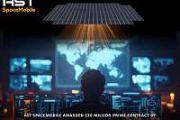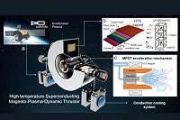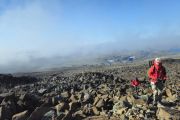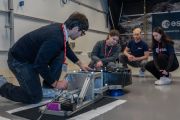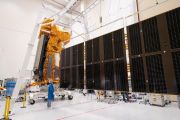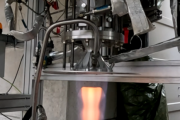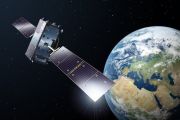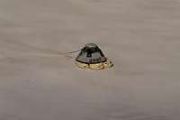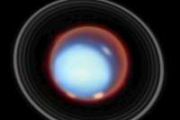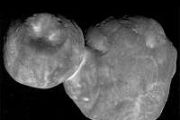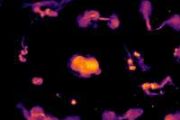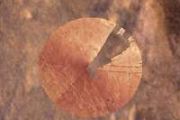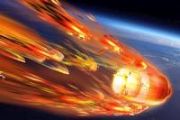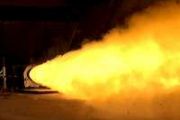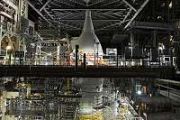
Copernical Team
Beyond Gravity positions new modular satellite platform for European LEO missions
 Beyond Gravity is expanding from supplying satellite components to delivering complete satellites based on a new low Earth orbit platform. The company aims to offer turnkey spacecraft to institutional and government customers that can be placed in orbit on relatively short timelines.
The space technology firm, headquartered in Zurich, already provides structures, thermal protection, comput
Beyond Gravity is expanding from supplying satellite components to delivering complete satellites based on a new low Earth orbit platform. The company aims to offer turnkey spacecraft to institutional and government customers that can be placed in orbit on relatively short timelines.
The space technology firm, headquartered in Zurich, already provides structures, thermal protection, comput ArkEdge boosts 6U micro-satellite fleet with three-satellite AE5R launch
 Tokyo, Japan, December 1, 2025 - ArkEdge Space Inc., a Tokyo-based space technology company that designs, builds, and operates micro-satellite constellations, has launched three new 6U-class satellites AE5Ra, AE5Rb, and AE5Rc and begun initial operations, bringing its in-house developed and operated satellite fleet to twelve.
The AE5R satellites rode to orbit on the SpaceX Falcon 9 Transpo
Tokyo, Japan, December 1, 2025 - ArkEdge Space Inc., a Tokyo-based space technology company that designs, builds, and operates micro-satellite constellations, has launched three new 6U-class satellites AE5Ra, AE5Rb, and AE5Rc and begun initial operations, bringing its in-house developed and operated satellite fleet to twelve.
The AE5R satellites rode to orbit on the SpaceX Falcon 9 Transpo ESO signs MOSAIC deal for Extremely Large Telescope spectrograph
 The European Southern Observatory ESO has signed an agreement with a large international consortium for the design and construction of the Multi-Object Spectrograph MOSAIC, an instrument for the Extremely Large Telescope ELT. On what will be the world's largest optical telescope, MOSAIC will simultaneously measure the light from hundreds of astronomical sources, tracing the growth of galaxies an
The European Southern Observatory ESO has signed an agreement with a large international consortium for the design and construction of the Multi-Object Spectrograph MOSAIC, an instrument for the Extremely Large Telescope ELT. On what will be the world's largest optical telescope, MOSAIC will simultaneously measure the light from hundreds of astronomical sources, tracing the growth of galaxies an NASA backs WHOI effort to read organic signals from ocean worlds
 Ocean worlds such as Jupiter's icy moon Europa and Saturn's moon Enceladus are emerging as prime locations to search for life beyond Earth, potentially including a second, independent origin of life within the Solar System. With NASA's Europa Clipper spacecraft scheduled to arrive at Europa in 2030 to assess whether its icy crust or subsurface ocean can sustain life, Woods Hole Oceanographic Ins
Ocean worlds such as Jupiter's icy moon Europa and Saturn's moon Enceladus are emerging as prime locations to search for life beyond Earth, potentially including a second, independent origin of life within the Solar System. With NASA's Europa Clipper spacecraft scheduled to arrive at Europa in 2030 to assess whether its icy crust or subsurface ocean can sustain life, Woods Hole Oceanographic Ins The Dos and Don'ts You Need to Keep in Mind When Playing Online Casino Games
 Going from brick-and-mortar gambling halls to digital apps didn't just tweak the industry; it completely flipped it on its head. We used to have to get dressed up, drive out, and physically walk onto a casino floor to place a wager.
Going from brick-and-mortar gambling halls to digital apps didn't just tweak the industry; it completely flipped it on its head. We used to have to get dressed up, drive out, and physically walk onto a casino floor to place a wager. NASA prepares long duration Antarctic balloon campaign to probe neutrinos and dark matter
 NASA's Scientific Balloon Program is returning to Antarctica for a new long-duration campaign featuring two zero-pressure balloon launches from a site near the U.S. National Science Foundation's McMurdo Station on the Ross Ice Shelf. The flights will carry the Payload for Ultrahigh Energy Observations (PUEO) and the General AntiParticle Spectrometer (GAPS), both focused on high-energy astrophysi
NASA's Scientific Balloon Program is returning to Antarctica for a new long-duration campaign featuring two zero-pressure balloon launches from a site near the U.S. National Science Foundation's McMurdo Station on the Ross Ice Shelf. The flights will carry the Payload for Ultrahigh Energy Observations (PUEO) and the General AntiParticle Spectrometer (GAPS), both focused on high-energy astrophysi Digital twin successfully launched and deployed into space
 A dynamic digital twin designed by UC Davis researchers was launched into Earth's orbit last week aboard a SpaceX rocket. The innovation, which will model the current condition and predict the future condition of the spacecraft's power system, was carried by a Proteus Space satellite and is the first of its kind to be sent into space.
The rocket was launched Nov. 28 from Vandenberg Space F
A dynamic digital twin designed by UC Davis researchers was launched into Earth's orbit last week aboard a SpaceX rocket. The innovation, which will model the current condition and predict the future condition of the spacecraft's power system, was carried by a Proteus Space satellite and is the first of its kind to be sent into space.
The rocket was launched Nov. 28 from Vandenberg Space F Bio-hybrid robots turn food waste into functional machines
 EPFL scientists have integrated discarded crustacean shells into robotic devices, leveraging the strength and flexibility of natural materials for robotic applications.
Although many roboticists today turn to nature to inspire their designs, even bioinspired robots are usually fabricated from non-biological materials like metal, plastic and composites. But a new experimental robotic manipu
EPFL scientists have integrated discarded crustacean shells into robotic devices, leveraging the strength and flexibility of natural materials for robotic applications.
Although many roboticists today turn to nature to inspire their designs, even bioinspired robots are usually fabricated from non-biological materials like metal, plastic and composites. But a new experimental robotic manipu Gravitational wave signals reveal dark matter around black holes
 A research team at the University of Amsterdam has developed a new general-relativistic model that shows how gravitational waves from black holes can be used to reveal dark matter and constrain its properties. The model follows in detail how a massive black hole interacts with its surrounding matter and how this interaction alters the emitted gravitational-wave signal.
Rodrigo Vicente, The
A research team at the University of Amsterdam has developed a new general-relativistic model that shows how gravitational waves from black holes can be used to reveal dark matter and constrain its properties. The model follows in detail how a massive black hole interacts with its surrounding matter and how this interaction alters the emitted gravitational-wave signal.
Rodrigo Vicente, The New mass measurements refine X ray burst reaction flow
 A team at the Institute of Modern Physics of the Chinese Academy of Sciences has directly measured the masses of the short lived nuclei phosphorus-26 and sulfur-27, providing data needed to determine a key nuclear reaction rate in Type I X ray bursts on neutron stars.
The study reports high precision mass measurements of these proton rich nuclei, which are important for modeling the rapid
A team at the Institute of Modern Physics of the Chinese Academy of Sciences has directly measured the masses of the short lived nuclei phosphorus-26 and sulfur-27, providing data needed to determine a key nuclear reaction rate in Type I X ray bursts on neutron stars.
The study reports high precision mass measurements of these proton rich nuclei, which are important for modeling the rapid 








